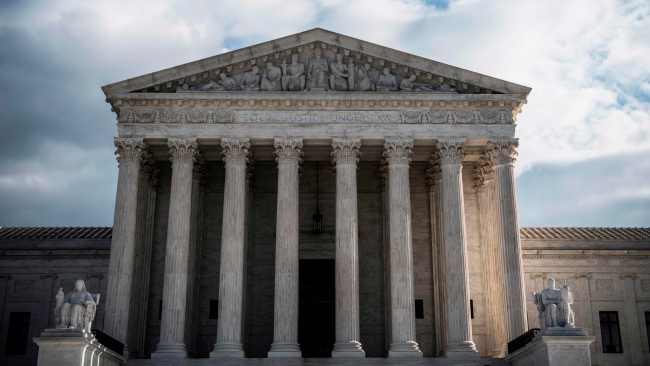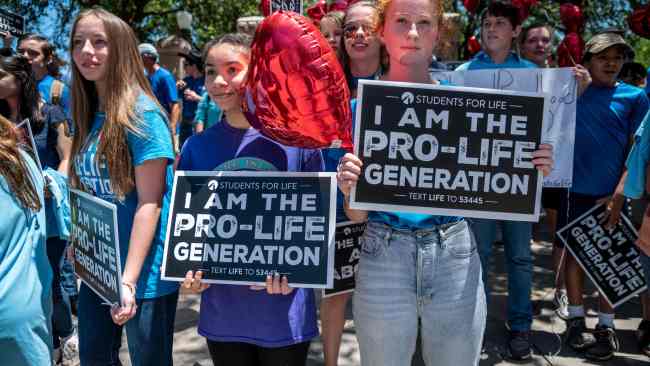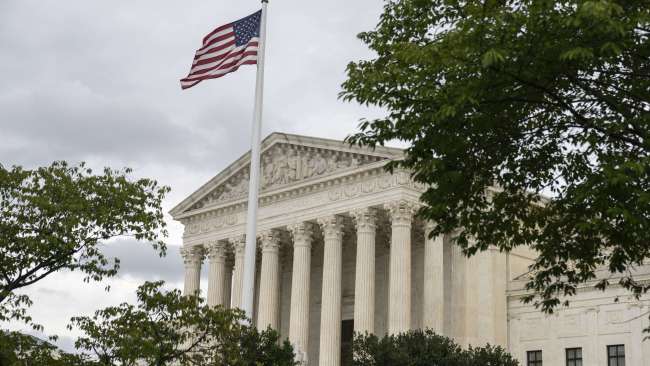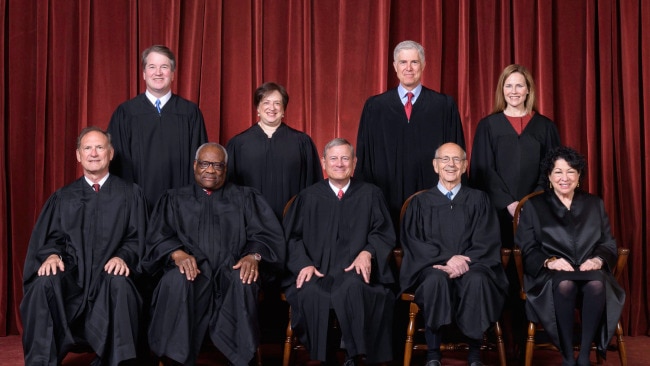US Supreme Court bitterly divided over contentious Texas abortion law
US President Joe Biden has accused the nation's Supreme Court of unleashing fresh "unconstitutional chaos" after a bitterly divided ruling.

The US Supreme Court has split bitterly down the middle over a contentious anti-abortion law in Texas, refusing to strike it down by a single vote.
The law in question, called S.B. 8, bans virtually all abortions from about six weeks of pregnancy, when a fetal heartbeat may first be detected.
That is before most women even realise they are pregnant, and it flies in the face of Supreme Court precedent.
The court's previous landmark rulings, including Roe vs Wade in 1973 and Planned Parenthood of Southeastern Pennsylvania vs Casey in 1992, established that governments could not ban abortion before fetal "viability", which is the point at which the fetus can realistically survive outside the womb. That threshold is reached at about 23 or 24 weeks of pregnancy.
Late last night, the Supreme Court denied an emergency request from abortion providers for an injunction, which would have prevented Texas's law from being enforced while litigation continued in the lower courts.
Five of the court's six conservative Justices - Clarence Thomas, Samuel Alito, Brett Kavanaugh, Neil Gorsuch and Amy Coney Barrett - voted to deny the petition. Chief Justice John Roberts joined with the three liberals - Sonia Sotomayor, Stephen Breyer and Elena Kagan - to form the minority.


Before we get stuck into the Justices' opinions, I should explain the unusual way in which S.B. 8 is designed to work, because it's at the heart of the court's ruling.
The six-week ban itself is fairly typical of conservative attempts to rewrite abortion restrictions across the US. It contains limited exceptions for cases in which the woman's life is under threat, and no such exceptions for cases of rape or incest.
The thing that distinguishes this law from others is the enforcement mechanism. Instead of enforcing the ban itself, the Texas government has empowered private citizens to sue any organisation or individual who "performs or induces an abortion" past six weeks, along with anyone who "aids or abets" a woman in getting such an abortion.
If the plaintiff succeeds in civil court, the defendant has to pay them a minimum of $US10,000 for each abortion performed, plus their legal fees.
The law came into effect yesterday and the consequences were immediate, as abortion providers started to turn away any women with a detectable fetal heartbeat. The clinics estimate 85 per cent of the women they would normally see will no longer be able to get an abortion.
The unusual enforcement scheme Texas devised is relevant here because it confuses the judicial process. Because the government is not directly enforcing the ban - indeed the legislation explicitly bars it from doing so - there is no government official for the abortion providers to sue in federal court. Hence the failure of their request for an injunction last night.
"The applicants now before us have raised serious questions regarding the constitutionality of the Texas law at issue," the Supreme Court's unsigned majority opinion read.
"But their application also presents complex and novel antecedent procedural questions on which they have not carried their burden.
"Federal courts enjoy the power to enjoin individuals tasked with enforcing laws, not the laws themselves. And it is unclear whether the named defendants in this lawsuit can or will seek to enforce the Texas law against the applicants in a manner that might permit our intervention.
"The sole private citizen respondent before us has filed an affidavit stating that he has no present intention to enforce the law.
"In light of such issues, we cannot say the applicants have met their burden to prevail in an injunction or stay application."
In short, then, the majority said it had no power to intervene.
The Justices stressed they did "not purport to resolve definitively any jurisdictional or substantive claim in the applicants' lawsuit".
"In particular, this order is not based on any conclusion about the constitutionality of Texas's law, and in no way limits other procedurally proper challenges to the Texas law, including in Texas state courts."

Each of the four Justices in the minority put their name to separate dissenting opinions. They argued that the court had allowed Texas to get away with a deliberately convoluted scheme to enforce an unconstitutional law.
"The court's order is stunning," Justice Sotomayor wrote in the most scathing of these opinions.
"Presented with an application to enjoin a flagrantly unconstitutional law engineered to prohibit women from exercising their constitutional rights and evade judicial scrutiny, a majority of Justices have opted to bury their heads in the sand.
"Last night, the court silently acquiesced in a state's enactment of a law that flouts nearly 50 years of federal precedents. Today, the court belatedly explains that it declined to grant relief because of procedural complexities of the state's own creation.
"Because the court's failure to act rewards tactics designed to avoid judicial review and inflicts significant harm on the applicants and on women seeking abortions in Texas, I dissent."
She said the Texas legislature was "well aware" of the "binding precedent" set by Roe and Casey, forbidding abortion bans before fetal viability.
"To circumvent it, the legislature took the extraordinary step of enlisting private citizens to do what the state could not," said Justice Sotomayor.
"In effect, the Texas legislature has deputised the state's citizens as bounty hunters, offering them cash prizes for civilly prosecuting their neighbours' medical procedures.
"By prohibiting state officers from enforcing the law directly and relying instead on citizen bounty hunters, the legislature sought to make it more complicated for federal courts to enjoin the law on a statewide basis.
"Taken together, the law is a breathtaking act of defiance - of the Constitution, of this court's precedents, and of the rights of women seeking abortions throughout Texas.
"Today, the court finally tells the nation that it declined to act because, in short, the state's gambit worked."
She argued the majority had "rewarded" the Texas legislature's trickery and the situation was "untenable".
"It cannot be the case that a state can evade federal judicial scrutiny by outsourcing the enforcement of unconstitutional laws to its citizenry."

"The statutory scheme before the court is not only unusual, but unprecedented," wrote Justice Roberts, the sole conservative dissenter.
"The legislature has imposed a prohibition on abortions after roughly six weeks, and then essentially delegated enforcement of the prohibition to the populace at large. The desired consequence appears to be to insulate the state from responsibility for implementing and enforcing the regulatory regime.
"I would grant preliminary relief to preserve the status quo ante (i.e. keep things as they were before the law went into effect) so that the courts may consider whether a state can avoid responsibility for its laws in such a manner."
He warned that allowing the law to go ahead could turn it into a "model for action" in other policy areas. To pick something comparable from the other side of politics, for example, a state could pass a ban on guns that violates the Second Amendment, and avoid judicial scrutiny by deputising private citizens to enforce it.
Justice Kagan said the court had "greenlit" a "patently unconstitutional law".
"The court thus rewards Texas's scheme to insulate its law from judicial review by deputising private parties to carry out unconstitutional restrictions on the state's behalf," she said.
"As of last night, and because of this court's ruling, Texas law prohibits abortions for the vast majority of women who seek them, in clear, and indeed undisputed conflict with Roe and Casey."
She accused the majority of "barely bothering" to explain its conclusion "that a challenge to an obviously unconstitutional abortion regulation backed by a wholly unprecedented enforcement scheme" was unlikely to prevail.
President Joe Biden issued an aggressive statement today blasting the Supreme Court's ruling. He called it "an unprecedented assault on a woman's constitutional rights".
"By allowing a law to go into effect that empowers private citizens in Texas to sue healthcare providers, family members supporting a woman exercising her right to choose after six weeks, or even a friend who drives her to a hospital or clinic, it unleashes unconstitutional chaos and empowers self-anointed enforcers to have devastating impacts," he said.
"Complete strangers will now be empowered to inject themselves in the most private and personal health decisions faced by women.
"This law is so extreme that it does not even allow for exceptions in the case of rape or incest. And it not only empowers complete strangers to inject themselves into the most private of decisions - it actually incentivises them to do so with the prospect of $10,000 if they win their case.
"Rather than use its supreme authority to ensure justice could be fairly sought, the highest court of our land will allow millions of women in Texas in need of critical reproductive care to suffer while courts sift through procedural complexities."
Mr Biden said he was ordering a "whole of government effort" to respond to the decision and protect women from Texas's "bizarre scheme".




